Stay in the know on all smart updates of your favorite topics.
Stream the Amsterdam Forever Young Programme on Eye Film Player

Discover the Amsterdam Forever Young program on the Eye Film Player, a diverse programme that explores the dynamic, ever-evolving spirit of Amsterdam. This collection of films highlights how the city’s unique identity has been shaped by its past, present, and future. Hence, we place a special focus on the intersection of urban development and planning, offering a look at how the city’s architectural and cultural transformations have intertwined in, both, historical films, as well as more contemporary filmic undertakings. Thus, our collection of films, such as Where the Rats are King, A Photographer Films Amsterdam and Amsterdam Global Village, shed light on the living conditions in Amsterdam, the urban communities witihin Amsterdam and, even, films as Jenny and Amsterdam on Film that shed light on how the canals have shaped Amsterdam more than aesthetically e.g., with its focus on ecology and care for our climate. Through, both, monetized and free to watch films, we aim to share the rich history of our city, whilst aiming for a dynamic space for creativity, inclusivity, and sustainability in the future, too that we hope this knowledge and collection will inspire.
All in all, Amsterdam Forever Young invites you to reflect on the city's evolution and its commitment to being a centre of modernity, without losing the essence of its heritage. Available on the Eye Film Player, to watch from your bedroom, this "digital" exhibition celebrates Amsterdam as the city of urban transformation that, at the same time, stay true to its historical roots.
United Nations International Procurement Seminar 11-12 March.

Are you interested in the possibilities of doing business with the United Nations (UN), the Asian Development Bank (ADB) and the World Bank (WB)? And would you like to get in touch with these organisations? Join us at UN IPS 2025 in Copenhagen! More info:
https://english.rvo.nl/topics/international-network/international-organisations
Bent u benieuwd naar de mogelijkheden om zaken te doen met de Verenigde Naties (VN), de Asian Development Bank (ADB) en de Wereldbank (WB)? Ga op 11 en 12 maart 2025 mee naar UN IPS 2025 in Kopenhagen. Lees meer en meld je aan:
https://www.rvo.nl/evenementen/un-international-procurement-seminar-2025-kopenhagen
Waag Open: Expeditie DNA Digitaal

Nog nooit was het zo makkelijk om je DNA te laten testen, op afkomst, verwantschap en op gezondheid. Je staat daarbij je meest persoonlijke data af, zonder controle te hebben over wat er met die gegevens gebeurd. Gelukkig kan het digitaliseren van DNA binnenkort ook anders - op zo’n manier dat we een bruikbare database voor de samenleving bouwen, terwijl jij controle over je eigen data behoudt. Tijdens Waag Open op donderdag 12 december duiken we in de waarde en in de risico’s van een digitale DNA databank. Maak kennis met de eerste testpersonen en ontwerp zelf mee!
Kijk voor meer informatie op waag.org.
Datum: Donderdag 12 december
Tijd: 19:30 - 22:00 uur
Locatie: Waag, Nieuwmarkt 4, Amsterdam
Waag Open
Elke eerste donderdagavond van de maand opent Waag haar deuren! Kom langs om te discussiëren en te doen. Want we gaan niet alleen in discussie over maatschappelijke thema's en de toekomst – je leert daarnaast ook altijd iets praktisch. Iets dat je altijd al hebt willen uitproberen, zoals de 3D-printer in het FabLab, of juist iets dat je nooit had verwacht, zoals uitpluizen hoe DNA in elkaar zit in ons biotech-lab. Waag Open vindt plaats in de maakplaatsen op de eerste en tweede verdieping van het historische Waaggebouw op de Nieuwmarkt.
In Residence Open Events program 2025
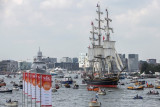
Entrepreneurs test innovations during SAIL and Marathon
Public events like SAIL and the Marathon draw millions of visitors to Amsterdam. These events often take place in central locations where large crowds gather. As a result, various logistical arrangements need to be made, such as providing food and drinks, public toilets, and temporary modifications to streets. These situations pose sustainability and accessibility challenges for the city. However, they also make these events ideal testing grounds for innovations.
Testing with the city and event organizers
The In Residence program offers entrepreneurs the opportunity to test their innovations during public events. They work closely with event organizers, the City of Amsterdam, and an experienced mentor. Additionally, funding is available to support the pilot. If the innovation proves to benefit the city, the municipality may purchase it after the program.
Applications are open from October 1 to November 17. Selected entrepreneurs will prepare their pilot in early 2025, and most pilots will take place during the summer events, especially during SAIL 2025.
Apply via the website: https://innovatiepartners.nl/project/in-residence-open-evenementen-2025
Amsterdam 750th anniversary year
This is the second round of the In Residence Events program. During the 2024 event season, nine entrepreneurs tested their innovations, including at Pride Week, the Marathon, and the Dam tot Dam Run. If successful, innovations from both rounds of the program may be implemented during the events of Amsterdam’s 750th anniversary celebrations.
Interested or any questions? You can get in touch with Mark Stoevelaar (mark.stoevelaar@amsterdam.nl)
Photo: Edwin van Eis
PIM helps Amsterdam based business owners take steps towards a circular economy
The Programma Investeringsgereed Innovatief Mkb Noord-Holland (PIM NH) is a project initiated by the province of Noord-Holland, supported by the municipality of Amsterdam, and executed by KplusV, Preneurz, and Innovate Today. Through PIM NH, we actively support innovative and sustainable SMEs with growth and financing challenges. Over the past 7 years, we have assisted more than 900 entrepreneurs and helped secure over 250 million euros in financing.
SMEs play a key role in the transition to a circular economy by 2050. The municipality of Amsterdam has committed to supporting these businesses in making this transition. As a result, PIM, on behalf of the municipality of Amsterdam, will assist small and medium-sized business owners in taking steps toward a circular economy.
'PIM Circular Mkb Amsterdam'
PIM helps entrepreneurs achieve their circular ambitions by increasing the success rate of circular business cases and securing financing for their implementation. We provide support for circular challenges such as: "Is my circular business case fundable?" and "What financing options are available for my circular business case?"
For Who is 'PIM Circular Mkb Amsterdam'?
'PIM Circular Mkb Amsterdam' is available to entrepreneurs who:
- Are based in the municipality of Amsterdam;
- Have a minimum turnover of 500,000 euros;
- Have been in business for at least 5 years and have up to 250 employees;
- Have circular ambitions.
More Information
If you're curious about the possibilities for your business or want to sign up for PIM Circular Mkb Amsterdam, please contact us on: jeroen@pimnh.nl
YIMBY Harvest Festival
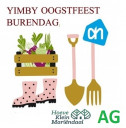
YIMBY Arnhem! is a bottom-up movement aiming at small scale food growing in the city of Arnhem (NL). The 10 ten years of green YIMBY Arnhem! experience shows the fun and cooperation of urban growing food. The YIMBY experience also shows that in time small initiatives grow to major results in empowering green people in the city.
<strong>Green stewardship</strong> More than 50% of the European population currently lives in urban areas, a proportion that is projected to increase to almost 70% by 2050. Distributed small scale urban food growers can together make a difference in providing healthy food in cities, in a climate neutral and sustainable way. The city of Arnhem has the potential to grow 10% of the vegetables and herbs in 2050,
True Price Lab is launched

The True Price Lab is a project focusing on willingness to pay the true price for food and drink.
From 26 February to mid-June 2024, the restaurant and espresso bar in the Corry Tendeloo Building of the Amsterdam University of Applied Sciences will be dedicated to the True Price Lab. For four months, students and staff will be able to choose between paying the normal or true price for a number of products. This project is an initial exploration of consumers' willingness to pay the true price, which includes hidden environmental and social-impact costs.
True price versus consumer price
The true price can be defined as the price applicable after calculating and improving the true price of a product. The true price is based on the retail price plus the sum total of external social and environmental costs. Traditional pricing disregards these external costs, which are effectively paid for by society. For example, the retail price of a cup of coffee does not include the environmental damage of pest control or the underpayment of the farmers who grow the coffee.
The full extra amount that participants pay when they voluntarily opt for the true price will go to the non-profit organisation Solidaridad. Solidaridad wants to make the world a place where everything is made and bought in solidarity with people, the environment and future generations. Visitors to the restaurant and espresso bar can learn more about what their contributions will be used for by scanning a QR code.
Piss Soap Workshop at W139 (Amsterdam)

Dear Community,
This Saturday at w139 from 14:00-17:00 I will be facilitating a workshop on how to make your own soap with waste, including your golden biofluid.
Throughout the entire Piss Soap workshop, the basics of ecodeviance will be presented and exemplified throughout the process of saponification. We will review the possibility for local and tangible regenerative design, circular ecology and how to tackle the climate crisis while providing cleaning products. The workshop will present the full process of saponification and the steps required to transform domestic waste into usable soap. We will mix the various ingredients and create a circular process informed by waste management. The participants will have the opportunity to create intimate and personal outcomes from their own (bio) wastes. At the end of the workshop, everybody will come back home with 750g of soap to cure at home. After the 3 months needed to its complete maturation, the soap will be ready to be used for washing.
It is all free of charge, feel free to register by sending an email to piss.soaps@gmail.com
Exploring the Future of Data in the Circular Economy: Highlights from Data Dilemma’s!
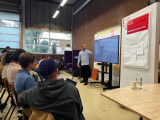
Amsterdam, a city with an ambitious goal of becoming fully circular by 2050, envisions a future where materials are continuously reused, waste is minimized, and resource cycles are closed. Achieving this vision hinges on the availability and analysis of data, which allows us to assess the extent to which materials are used, reused, or wasted. However, this data is often elusive, complex to analyse, and, in some cases, not even recorded. These challenges surrounding circular data were the focal point of our recent event, "Data Dilemma's: Collecting Data for the Circular Economy."
During Data Dilemma's, we explore the possibilities for using data and new technologies to address urban and societal challenges, with a focus on responsible digitalization. The goal is to use data to make cities more safe, clean and accessible. But what happens to all the data that is collected? Which dilemmas do we encounter when we collect (personal) data to improve the city.
Apparently, the topic of this edition of Data Dilemma’s was not only of interest to the Amsterdam Smart City team, since this event was completely sold out. This was no surprise, with the three incredible speakers we had lined up: Mersiha Tepic (municipality of Amsterdam), Maarten Sukel (Picnic), and Joris Bouwens (Metabolic).
Mersiha Tepic: Circular Economy Monitor Amsterdam
Mersiha Tepic, Senior Researcher at the Research & Statistics department of the Municipality of Amsterdam, demonstrated the Circular Economy Monitor Amsterdam. This essential tool tracks Amsterdam's progress towards a circular economy and identifies areas requiring further attention.
The monitor gives interesting insights. For instance, it shows that the environmental impact of food is four times as big as the impact of the built environment, even though the amount of materials used in the built environment is four and a half times larger than for food.
It reveals that food has a very high environmental per kilogram compared to materials from the built environment. This is interesting because it makes the total environmental impact of food much higher than the impact of the built environment, even though the built environment uses four times as much mass in materials than food.
For more information on the circular monitor and all its insights, you can check out their (Dutch) website.
During her presentation, Mersiha also delved into the data dilemma she faces in this project—the scarcity of data from significant commercial entities operating within the city. The lack of data from these key players poses a considerable challenge to Amsterdam's circular ambitions, and Mersiha's work sheds light on the importance of bridging these data gaps.
Maarten Sukel: Data-Driven Precision at Picnic
Our second speaker, Maarten Sukel, a Data Scientist at Picnic Technologies, showcased how the online supermarket Picnic leverages data. He presented an innovative approach that combines traditional data sources with images, written descriptions, and geographical information to predict customer preferences accurately. By doing so, Picnic not only optimizes its supply chain but also minimizes waste, aligning with the circular economy's core principles.
Maarten's insights provided a glimpse into how data-driven precision can be a game-changer in the pursuit of sustainability and waste reduction, and he also gave a convincing sales pitch on why you should be a customer of Picnic.
Joris Bouwens: The Promise of Digital Product Passports
Closing the event was Joris Bouwens, a Project Manager and Senior Consultant at Metabolic's Circular Industries team. Joris shed light on Digital Product Passports and their potential to revolutionize the circular economy. These passports offer a comprehensive digital record of a product's lifecycle and environmental impact, empowering consumers to make informed choices and encouraging responsible consumption and recycling.
Joris's presentation highlighted the immense opportunity presented by Digital Product Passports in getting as much value from used products as possible. To fully illustrate the potential of Digital Product Passport, Metabolic has created a visualization of the data flows in four sectors: Electronics, Chemicals, Apparel, and Construction. You can find these visualizations here.
We extend our gratitude to our amazing speakers for their invaluable contributions and to our engaged audience for their active participation in the discussion.
In the next edition of Data Dilemma’s we will delve into the fascinating world of the underground. What cables, tubes, and other assets can be found there, how is the data on these assets shared, and how can we improve collaboration? We hope to see you there on the 26th of October.
Do you have any suggestions for which Data Dillema's we should uncover next? Let us know in the comments below.
MKB'ers gezocht voor panel

Ben jij oprichter, directeur of manager van een MKB bedrijf dat zich (nog) niet echt bezighoudt met circulariteit? Dan zijn we op zoek naar jou!
Op 10 oktober organiseren we vanuit Amsterdam Smart City een werksessie waarin we de vraag willen beantwoorden: "Hoe brengen we circulariteit naar het MKB?". Deze sessie wordt georganiseerd in samenwerking met de gemeente Amsterdam, en er zullen nog meer overheden aanwezig zijn. Om deze vraag goed te beantwoorden hebben we de input van echte MKB'ers nodig. We willen weten waar ze tegen aan lopen en wat overheden beter kunnen doen om ze te helpen.
Klinkt dit je interessant in de oren, of ken je iemand die perfect is voor dit panel? Neem dan contact met mij op: noor@amsterdamsmartcity.com
4. Informative plinths

This article is part of the series 25 building blocks to create better streets, neighbourhoods, and cities. Read how design, starting from street-level view contributes to the quality of the urban environment.
Plinths express the nature of activities inside
The visual quality, design and decoration of the plinth, the 'ground floor' of a building, contributes significantly to the quality of the streetscape and to the (commercial) success of the activities that take place at plinth level. This also applies, for example, if the activities of a workshop can be observed through the windows. Blank walls speed up visitors' pace, unless this wall has attractive art. Vacancy is disastrous.
A plinth displays the destination of a building or a part of it (photo bottom left). Fashion stores and suppliers of delicacies depend on its ability to attract buyers. There is nothing against allowing the plinth to expand slightly onto the street - think of beautiful displays of fresh vegetables - if a sufficiently wide barrier-free pedestrian route is maintained.
The total length of streets that must generate customers and visitors must not be too long in order to keeps vacancy to a minimum. This may mean that still profitable shops in streets where the number of vacancies is increasing must consider moving if revitalization of the street is infeasible. The space left behind can best be revamped into space for housing or offices to prevent further dilapidation.
Plinths of non-commercial destinations
The need for an attractive plinth also applies to non-commercial spaces. This may concern information centers, libraries, day care centers for children or the elderly, places where music groups rehearse, etcetera. Co-housing and co-working centers might also concentrate several activities in a semi-public print. In an apartment building, you might like to see an attractive portal through the glass, with stairs and elevators and a sitting area.
Residential plinths
Houses in the more central parts of the city can also have an attractive plinth. In practice, this happens often by placing plants and creating a seat on the sidewalk. The so-called Delft plinths are narrow, sometimes slightly raised additional sidewalks for plants, a bench, or stalling bicycles (photo bottom middle). The worst is if the plinth of a private house is mainly the garage door.
The aesthetics of the plinth
In many pre-war high streets, the plinth was designed as an integral part of the building. In the ‘60s and ‘70s, many retailers modernized their businesses and demolished entire ground floors. The walls of the upper floor, sometimes of several buildings at the same time, rested on a heavy steel beam and the new plinth was mainly made of glass (photo top left). Often a door to reach the upper floors is missing, complicating the premises’ residential function. Initially, these new fronts increased the attractivity of the ground floor. However, the effect on the streetscape has turned out to be negative. In Heerlen, artist and 'would be' urban planner Michel Huisman (the man behind the Maankwartier) is busy restoring old shopfronts together with volunteers and with the support of the municipality (photos top right). In Amsterdam, shopfronts are also being restored to their original appearance (photo bottom right).
Plinths policy
The sky is the limit for improving plinths, as can be seen in the book Street-Level Architecture, The Past, Present and Future of Interactive Frontages by Conrad Kicker and the *Superplinten Handbook</em> , commissioned by the municipality of Amsterdam.
In 2020, a plinth policy was introduced in the Strijp-S district in Eindhoven from a social-economic background. 20% of the available plinths is destined for starters, pioneers and 'placemakers'. Continuous coordination with the target group is important here. In The Hague, 100 former inner-city shops have now been transformed into workplaces for young and creative companies. Differentiating rents is part of the plinth policy too.
Follow the link below to find an overview of all articles.
Afval naar Oogst feest

Uitnodiging
Afval naar Oogst feest
Zaterdag 23 september 2023 tussen 10.00 - 16.30 uur
Leer van afval iets moois te maken!
Groente- en fruitafval upcyclen, en zo bijdragen aan een duurzame stad? Doe ideeën op tijdens het Afval naar Oogst feest. Het borrelt en bruist op wel elf locaties, dus ook bij jou in de buurt!
Kom kijken en meedoen op de volgende Afval naar Oogst locaties:
Noord: Moestuinschool Noord
West: Wachterliedplantsoen, MidWest, GWL-terrein, I can change the world with my two hands en Zimmerhoeve
Nieuw-West: Stadsboerderij Osdorp en The Beach
Oost: KIT/Tropentuin en Meevaart
Zuidoost: Stadspark Brasa
Ze hebben allemaal een eigen programma en eigen tijden.
Kijk op afvalnaaroogst.nl
Afval naar Oogst, een initiatief voor een gezondere, duurzame stad
Wist je dat de vuilniszak van iedere Amsterdammer gemiddeld voor een derde gevuld is met organisch afval? Er verdwijnen enorm veel schillen en klokhuizen, loof, zaden en pitten in de vuilnisbak. Afval naar Oogst heeft al elf locaties door heel Amsterdam waar stadsbewoners hun groente- en fruitafval kunnen inleveren. Dat afval wordt tot waardevolle compost verwerkt en gebruikt in de tuinen van de locaties. Zo draagt het direct bij aan een gezonde stadsbodem waarop groenten, kruiden, fruit en bloemen verbouwd kunnen worden. Van afval naar oogst, dus.
Kom naar het feest!
Met het Afval naar Oogst feest willen we het upcyclen vieren en laten zien wat je naast composteren nog meer met keukenafval kunt doen. Hoe je van groenteschillen verf kunt maken bijvoorbeeld of kom bodemleven onder de microscoop bestuderen. Er is van alles te ontdekken!
Kijk op de website voor meer informatie over de elf locaties die aan het Afval naar Oost feest meedoen. Ze hebben allemaal een eigen programma, dus kijk, kies en maak er een mooie dag van. Aanmelden is niet nodig.
Data Dilemma’s: Collecting Data for the Circular Economy

Amsterdam has the intention to become a fully circular city by 2050. A city where we reuse materials, avoid waste, and close resource cycles. To track this we need a lot of data so that we can assess to which extent materials are used, reused, or wasted. This data is however not always publicly available, complicated to analyse, and sometimes not even registered. These topics around circular data will all be covered in this edition of data dilemmas.
The Circular Economy Monitor Amsterdam charts the extent to which Amsterdam’s economy is becoming more circular and identifies areas where more needs to be done. Mersiha Tepic, Senior Researcher at the Research & Statistics department of the municipality of Amsterdam, will give a demo of the Monitor and elaborate on her data dilemma in this project: the lack of data from significant (commercial) parties in the city.
The online supermarket Picnic, is very on top of its own data. Our second speaker Maarten Sukel is Data Scientist working at Picnic Technologies. He will present how Picnic uses cutting-edge methods that combine traditional data sources with pictures, written descriptions, and geographical information to predict what products their customers will want next, and how to minimize waste.
The last speaker of the day will be Joris Bouwens. Joris is a project manager and senior consultant in the Metabolic’s Circular Industries team. He will present what Digital Product Passports are and the huge opportunity they give for a more circular economy.
Agenda
- 15:45 – 16:00 Walk-in
- 16:00 – 16:10 Welcome and introduction by Amsterdam Smart city
- 16:10 – 16:25 Demo of the Circular Economy Monitor Amsterdam by Mersiha Tepic (municipality of Amsterdam
- 16:25 – 16:35 Maarten Sukel (Picnic) on using data science to minimize waste.
- 16:35 – 16.45 Joris Bouwens (Metabolic) on digital product passports.
- 16:45 – 17:00 Q&A and panel discussion
- 17:00 – 17:30 Wrap-up and drinks
About the Data Dilemma’s series
Data Dilemmas is a collaboration between Amsterdam Smart City and the City of Amsterdam’s Data Lab. Three times a year we explore the possibilities for using data and new technologies to address urban and societal challenges, with a focus on responsible digitalization. The goal is to use data to make cities more safe, clean and accessible. But what happens to all the data that is collected? Which dilemmas do we encounter when we collect (personal) data to improve the city? These questions are important for everyone: governments, knowledge institutions, companies, and civil society. Amsterdam Smart City would like to explore with you which decisions are needed for responsible use of data.
Location
Marineterrein, Kattenburgerstraat 5, Building 027S
Source Image: Gemeente Amsterdam, Onderzoek en Statistiek.
Demoday #20: Plastic, we love it!
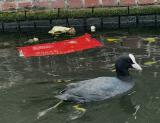
Ons plasticverbruik stijgt nog steeds drastisch
Technisch gezien zijn alle oplossingen voorhanden om ons plasticgebruik drastisch te verminderen in zowel productieprocessen en het voorkomen en/of verwijderen van microplastics in de natuur. Toch verandert er in de praktijk bijna niets. Er zijn veel initiatieven, maar de vraag is of die een daadwerkelijk verschil maken, want als we naar de cijfers kijken stijgt ons plasticgebruik nog steeds drastisch. Sinds 2000 is ons plasticverbruik zelfs verdubbeld!
Waarom verandert er zo weinig?
Hoe kan het dat we, ondanks dat we weten hoe slecht het is voor onszelf en het milieu, er niets significant veranderen aan ons plasticgebruik? En wat kunnen we doen om het plasticprobleem nu wél echt aan te pakken in de regio? Deze vragen stonden centraal tijdens de werksessie ‘Plastic, we love it.’ Tijdens de werksessie hebben de aanwezige strategische denkkracht gemobiliseerd om samen tot nieuwe inzichten komen in de keten van plasticgebruik én nieuwe oplossingsrichtingen met elkaar te bedenken.
Gek, gekker, goed!
Als we doorgaan zoals we nu doen, gaat het dus niet lukken. Daar zijn we het met elkaar over eens. Maar hoe dan wel? Om dat met elkaar helder te krijgen, hebben we eerst een aantal echt onrealistische en misschien zelfs wel onethische oplossingen bedacht. En dat hebben we geweten. Van ‘geen kinderen meer krijgen’ tot aan ‘recyclepolitie op de hoek van elke straat’ en het ‘verbieden van alle plastics’ werden geopperd. En probeerden we zelfs daar nog een schepje bovenop te doen. Natuurlijk niet om uit te voeren, maar wel om daarna weer te kunnen komen tot goede ideeën. We hielpen elkaar en werkten elkaars ideeën en oplossingsrichtingen uit tot realistische en goede ideeën.
Waar ligt jouw invloed?
Maar ideeën bedenken is makkelijk, maar de werkelijke uitdaging ligt bij het komen van idee naar plan naar uitvoering. Dus wat je kun zelf doen? Hoe kan ík een werkelijke bijdrage leveren aan het oplossen van dit complexe vraagstuk? Samen met de groep hebben we gekeken naar daar waar onze eigen invloed zit. De groep kwam met mooie concrete ideeën waar we zelf aan mee kunnen werken en aan kunnen jagen. In de top 3 stonden een bewustwordingscampagne, een plastic politie, lobby richting de politiek door bovenregionaal samen te werken en het belonen van goed gedrag. We kijken terug op een mooie werksessie met waardevolle uitkomsten en kijken uit naar het vervolg en natuurlijk vooral naar een echt resultaat: geen plastic meer in de natuur en in ons voedsel.
Marten Boels, dank voor het inbrengen van dit relevante en belangrijke onderwerp!
Knowing Cotton Otherwise - Flipping the Script
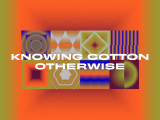
Cotton is perhaps the world's most well-known fabric, however, many stories behind cotton are lesser known. These untold and sometimes unexpected perspectives have been collected and brought together in the exhibition, Knowing Cotton Otherwise.
In the third and final chapter, Flipping the Script, designers Nsimba Valene Lontanga and Angelo Carlos Marcus Elizabeth take you on a journey through their heritage and culture while challenging you to reimagine fundamental concepts within the realm of fashion and design.
The exhibition unpacks and brings into question established ideas of 'classic' and 'basic' style staples, as well as redefining 'typically African' design and print. What happens when we reconsider our preconceived ideas of what cotton represents around the world?
Knowing Cotton Otherwise is open to the public until 16 October 2023 at the Fashion for Good Museum, Rokin 102, Amsterdam.
Clothes Swap/Kledingruil Event @Gast Art!
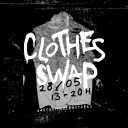
Your closet is feeling a tad musty? Got some cool trash clothes you don’t wear anymore, and want to get some pre-loved items in return? Come hang out, have a beer, listen to some music, make connections and renew your wardrobe!
🗓️ May 28th
⏰ 1pm - 8pm
📍 Gasthuismolensteeg 3, Amsterdam
Instructions:
1. Bring items you don’t wear anymore
2. Exchange for tokens
OR purchase tokens for 2,50€
3. Use tokens for second-hand clothes, curated by us and swapped by other participants
OR use tokens for drinks
4. Brag to your friends about how sustainable your new wardrobe is
Graphics by @tina.bez.ic
Metabolic CEO, Eva Gladek, was nominated for the Big Little Talk at Circularity 23!

Creating a sustainable planet for future generations is essential, and understanding our impacts on nature is a critical step toward achieving this goal.
Unfortunately, measuring impact on nature is complicated and requires specific expertise. We need to combine impact data with geospatial analysis to really see where the different activities along companies’ value chains are taking place, and how those impact nature and biodiversity locally.
By voting for Eva's Big Little Talk, you will Metabolic showcase the importance of nature assessments on the big stage at Circularity 23.
It takes only 1 minute, vote for our video in the link below.
#circularity23 #LinkByMetabolic #natureassessment
De appel valt vaak ver van de bak… BASSTA-seminar

Om hun circulaire doelstellingen te behalen willen veel gemeenten het afval van huishoudens meer en beter gescheiden inzamelen. Het blijkt echter moeilijk bewoners van met name hoogbouw te motiveren hun afval gescheiden in de container te gooien. In het project BASSTA is onderzoek gedaan naar hoe het gedrag van bewoners met betrekking tot het scheiden van afval kan worden beïnvloed. Tijdens dit seminar gaan we aan de hand van de resultaten van het onderzoek in gesprek met elkaar over hoe we de gestelde doelen kunnen behalen.
Lezing - Van vegansexuals tot kweekbossen
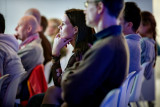
Welkom in jouw toekomst
Vegansexuals, verwarmingsschaamte, multi-taskend wonen en de kweek van megabossen: welkom in jouw toekomst.
We verbruiken meer energie dan ooit, maar onze toekomst ziet er anders uit: toekomst-antropoloog Roanne van Voorst voorspelt een samenleving waarin we simpeler en slimmer leven, maar ook een samenleving waarin we afscheid nemen van bepaalde rechten en romantische ideeën, en op zoek gaan naar wat zij noemt 'sociaal pragmatisme'.
Als ‘antropoloog van de toekomst’ onderzoekt Roanne hoe een duurzame en wenselijke toekomst van onze wereld eruit kan zien. Daarbij denkt ze vooral na over wat ze ‘duurzame menselijkheid’ noemt: hoe houden we hoop in tijden van klimaatverandering en ‘fake news’? Wat houdt ons menselijk in tijden van robotisering? Welke vaardigheden moeten we onszelf en onze kinderen aanleren, om ook in een hoogtechnologische toekomst menselijk en professioneel succesvol te blijven?
Over Roanne van Voorst
Roanne van Voorst is toekomst-antropoloog, schrijver, (Tedx)spreker en voorzitter van de Dutch Future Society. Ze promoveerde in 2014 en is momenteel verbonden aan de Universiteit van Amsterdam. Haar kernonderzoek richt zich op menselijkheid in tijden van robotisering, digitalisering en big data. Haar onderzoek onderzoekt deze onderwerpen in de context van de volksgezondheid in vier verschillende landen.
Praktisch
Voor een bezoek aan deze lezing in De Studio reserveer je een ticket via de website van NEMO. De toegangsprijs is € 7,50.
De lezing start om 20.00 uur en en duurt ongeveer 1 uur. Voorafgaand aan de lezing kun je vanaf 19.00 uur de tentoonstelling Energy Junkies bezoeken.
Op vertoon van een kortingspas ontvangen pashouders voorafgaand aan de activiteit een gratis drankje. Deelnemende passen zijn: Museumkaart, VriendenLoterij VIP-KAART, Stadspas Amsterdam, CJP pas en Collegekaart.
De Studio van NEMO is een extra locatie van NEMO Science Museum op het Marineterrein in Amsterdam. De programmering is speciaal voor volwassenen.
Lezing – Hoe het anders kan
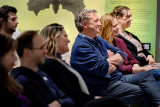
Economie is ideologie
Onze economie wordt gestuurd door kapitalisme. Problemen als klimaatverandering, sociale ongelijkheid en politieke polarisatie worden veroorzaakt door een systeem waarin de economie constant moet blijven groeien. Die kapitalistische economie lijkt een vast gegeven, maar niets is minder waar.
Volgens Kees Klomp is er een andere weg. Een weg waarin de macht verschuift van bedrijven naar burgers, die zich bewust keert tegen het groeien om te groeien en die zich kenmerkt door de behoefte aan zingeving. Die andere weg heet het commonisme (niet te verwarren met communisme). Een systeemverandering is volgens Klomp even noodzakelijk als onvermijdelijk. In deze lezing vertelt hij wat commonisme is en wat wij als burgers kunnen doen om verandering in gang te zetten.
Het nieuwe boeren
De boerenprotesten tegen het stikstofbeleid maken veel los. Veel boeren zijn tegen de kabinetsplannen, voelen zich in de hoek gedreven en vrezen voor hun voortbestaan.
Anne van Leeuwen is hét voorbeeld van hoe het anders kan. Ze werkt als regeneratieve boer op boerderij Bodemzicht. In de regeneratieve landbouw worden natuurlijke hulpbronnen versterkt in plaats van uitgeput. In deze lezing vertelt ze hoe de boerderij is ontstaan, over haar persoonlijke reis en de praktische realiteit op de grond. Daarnaast staat ze stil bij het belang van een regeneratieve economie voor de landbouwtransitie en geeft ze praktijkvoorbeelden. “Bodemzicht is mijn ode aan het leven. Het deed mij ontzettend zeer om zoveel leven om mij heen te zien verdwijnen. En Bodemzicht is een plek waar we concreet leven kunnen opbouwen, bodem kunnen herstellen én mensen kunnen voeden. Met onze regeneratieve boerderij Bodemzicht willen we laten zien dat natuur en landbouw geen tegengestelde werelden zijn, maar dat ze elkaar juist versterken. Hoe meer diversiteit, hoe meer veerkracht en ook meer productie. Op Bodemzicht boeren we voor sociale, ecologische en economische winst.”
Over Kees Klomp & Anne van Leeuwen
Kees Klomp (1968) studeerde Politicologie en Communicatiewetenschappen aan de UvA. Na vele jaren werkzaam te zijn geweest als businessconsultant, stapt Klomp in 2016 over naar het wetenschappelijke onderwijs en onderzoek. Klomp werkt momenteel als Lector Betekeniseconomie bij Hogeschool Rotterdam alwaar hij onderzoek doet naar economische systeemverandering en de doorvertaling hiervan in nieuw businessonderwijs. Klomp is daarnaast medeoprichter van THRIVE Institute; aanjager van Betekeniseconomie middels verschillende projecten. Klomp schreef verschillende boeken waaronder het studieboek Betekeniseconomie (Noordhoff), het Engelstalige THRIVE (Business Contact) en de managementboekbestsellers Handboek Betekenisvol Ondernemen en Pioniers van de Nieuwe Welvaart.
Anne van Leeuwen (1987) werkt onder de vlag van haar eenmanszaak Nieuwe Symbiose aan een fundamentele en praktische integratie van natuur en cultuur. Samen met haar vriend richtte ze regeneratieve boerderij Bodemzicht op. Tussen 2014 en 2018 werkte ze op ARTIS aan o.a. het Groote Museum. Daarna heeft ze met een collectief de Ambassade van de Noordzee opgericht, waar wetenschappers, kunstenaars en beleidsmakers toewerken naar een representatieve vertegenwoordiging van planten, dieren, microben en mensen in onze samenleving.
Praktisch
Voor een bezoek aan deze lezing in De Studio reserveer je een ticket via de website van NEMO. De toegangsprijs is € 7,50.
De lezing start om 20.00 uur en duurt ongeveer 1,5 uur. Voorafgaand aan de lezing kun je vanaf 19.00 uur de tentoonstelling Energy Junkies bezoeken.
Op vertoon van een kortingspas ontvangen pashouders voorafgaand aan de activiteit een gratis drankje. Deelnemende passen zijn: Museumkaart, VriendenLoterij VIP-KAART, Stadspas Amsterdam, CJP pas en Collegekaart.
De Studio van NEMO is een extra locatie van NEMO Science Museum op het Marineterrein in Amsterdam. De programmering is speciaal voor volwassenen.
Stay up to date
Get notified about new updates, opportunities or events that match your interests.

